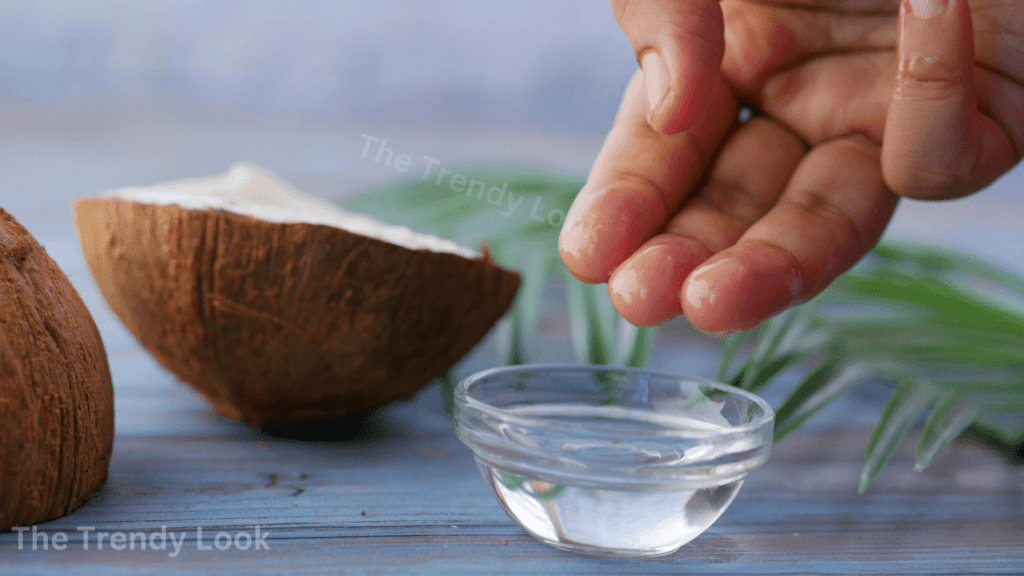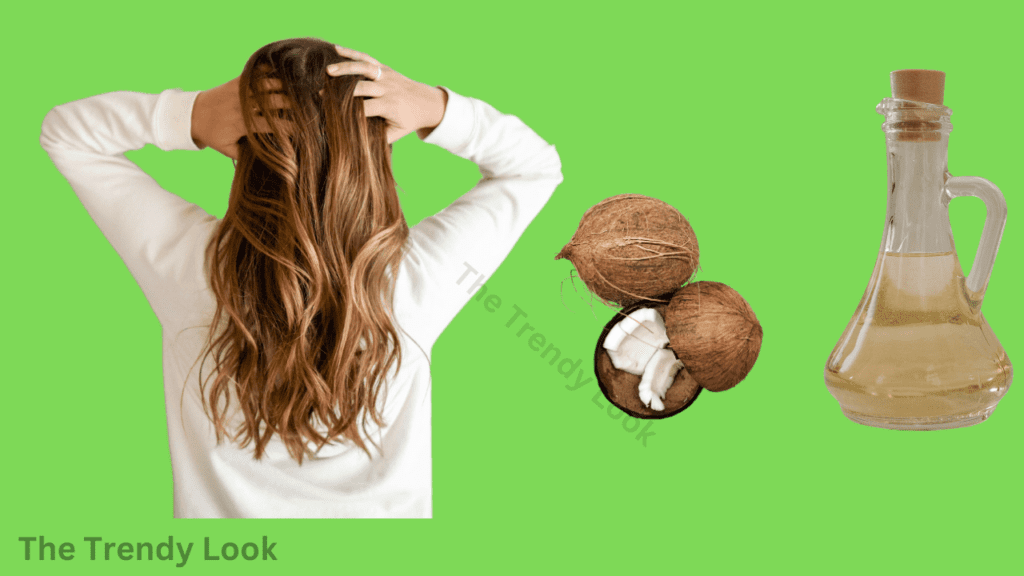eBooks
The Ultimate Guide to Coconut Hair Oil: Nature’s Elixir for Healthy, Lustrous Hair

Table of Contents
Coconut hair oil has long been hailed as one of nature’s most powerful hair care products. Its popularity spans across cultures, from the ancient Ayurvedic traditions of India to the tropical islands of the Pacific. If you’ve ever wondered why coconut hair oil is so revered, this guide will help you understand its benefits, applications, and why it should be a staple in your hair care routine.
What Is Coconut Hair Oil?
Coconut hair oil is extracted from the meat of mature coconuts harvested from the coconut palm tree (Cocos nucifera). It has a high concentration of fatty acids, especially lauric acid, which makes it an excellent choice for nourishing and moisturizing hair. When applied to the scalp and hair, coconut oil penetrates deeply, providing moisture and reducing protein loss. This makes it a versatile hair treatment, suitable for various hair types and conditions.
The Nutritional Profile of Coconut Hair Oil
Coconut oil is loaded with nutrients that contribute to hair health. The key components that make it beneficial for your hair include:
- Lauric Acid: A medium-chain fatty acid that penetrates the hair shaft, protecting the hair’s protein structure and preventing damage from the inside out.
- Vitamin E: A powerful antioxidant that supports a healthy scalp and hair, improving hair elasticity and reducing oxidative stress.
- Capric Acid and Caprylic Acid: These fatty acids provide antifungal and antimicrobial properties, keeping your scalp free from infections that could lead to hair loss or scalp irritation.
- Iron: Plays a vital role in promoting hair growth and preventing hair loss by ensuring proper blood circulation to hair follicles.
- Antioxidants: Help in protecting hair from environmental damage like pollution and UV rays.
Why Use Coconut Hair Oil? The Benefits for Hair Health
1. Deep Moisturization and Hydration
One of the primary reasons why people turn to coconut hair oil is its ability to provide intense moisture. The molecular structure of the oil allows it to penetrate the hair shaft more effectively than many other oils, meaning it doesn’t just sit on the surface but goes deep to nourish the hair from within. This helps retain moisture, keeping hair soft and smooth, reducing frizz, and making it more manageable.
2. Reduces Protein Loss
Protein loss is one of the leading causes of weak, brittle hair. Hair is composed of keratin, a type of protein, and when exposed to environmental factors, heat, or chemicals, the protein structure can weaken. Coconut oil, particularly because of its lauric acid content, helps reduce protein loss from both damaged and undamaged hair. Applying coconut oil before washing or styling can significantly protect hair from breakage.
3. Promotes Hair Growth
Coconut oil is believed to stimulate hair growth by improving blood circulation to the scalp. When massaged into the scalp, it can nourish the hair follicles, encourage growth, and strengthen existing strands. Additionally, the antimicrobial properties of coconut oil help to maintain scalp health by preventing conditions such as dandruff, which can otherwise obstruct hair growth.
4. Prevents Dandruff and Dry Scalp
Dry scalp and dandruff can be caused by a lack of moisture, fungal infections, or irritated skin. Coconut oil’s hydrating and antifungal properties help treat these conditions. Its fatty acids soothe irritation and reduce flakiness, while its antimicrobial elements prevent infections that can cause dandruff. Regular use of coconut oil can help maintain a healthy scalp, providing the ideal foundation for strong, healthy hair.
5. Protection Against Damage
Environmental stressors like pollution, UV rays, and excessive heat from styling tools can damage your hair over time. Coconut oil acts as a protective shield, guarding your hair against these external threats. Its antioxidant properties protect hair from free radical damage, while its ability to penetrate deep into the hair shaft helps fortify and strengthen hair from the inside.
6. Prevents Split Ends
Split ends can make hair look dull and frizzy, and the only surefire way to get rid of them is to trim them off. However, coconut oil can help prevent split ends by providing the moisture and strength that hair needs to avoid breaking and splitting. Applying coconut oil to the ends of your hair can help maintain its integrity and reduce the need for frequent trims.
How to Use Coconut Hair Oil in Your Routine
Now that we’ve covered the numerous benefits of coconut oil for hair, let’s discuss how to use it effectively in your hair care routine. Whether you want to use it as a leave-in conditioner, pre-shampoo treatment, or a styling product, coconut oil offers versatile applications.
1. As a Pre-Shampoo Treatment
Coconut hair oil works wonderfully as a pre-shampoo treatment to protect hair from protein loss. Before washing your hair, apply coconut oil generously to your hair and scalp. Leave it on for at least 30 minutes, or if possible, overnight for an intense treatment. This will help protect your hair from harsh shampoos and reduce the amount of moisture stripped during washing.
2. Leave-In Conditioner
For a natural, nourishing leave-in conditioner, take a small amount of coconut oil (just a few drops) and apply it to the ends of your hair after washing. Avoid using too much oil, as this can weigh your hair down and make it look greasy. Focus on the ends, where hair tends to be driest and most prone to damage.
3. Scalp Treatment for Dandruff
If you struggle with dandruff, try using coconut oil as a scalp treatment. Massage a generous amount of coconut oil into your scalp and leave it on for 20-30 minutes before washing your hair. The oil’s antifungal properties can help alleviate dandruff and promote a healthy, hydrated scalp.
4. Hair Mask
For deep conditioning, use coconut hair oil as part of a nourishing hair mask. Mix coconut oil with other natural ingredients like honey, avocado, or yogurt to create a hydrating mask. Apply the mixture to your hair, leave it on for 30 minutes to an hour, and then wash it out. Your hair will feel soft, smooth, and rejuvenated.
5. Styling Aid
If you’re dealing with frizz or flyaways, coconut oil can be a great natural styling product. Take a tiny amount and rub it between your palms, then lightly smooth it over the surface of your hair. This helps tame unruly strands and adds a beautiful shine without the need for synthetic styling products.

Coconut Hair Oil for Different Hair Types
While coconut oil is beneficial for most hair types, the way it’s used and its effectiveness can vary depending on your specific hair texture and needs.
1. Dry Hair
Coconut oil is highly beneficial for dry hair as it provides intense moisture. If your hair is prone to dryness, apply coconut oil as a leave-in conditioner or hair mask regularly to lock in hydration.
2. Oily Hair
People with oily hair should use coconut oil sparingly. It’s best to apply the oil only to the ends of the hair or use it as a pre-shampoo treatment to avoid weighing hair down.
3. Curly Hair
Curly hair tends to be drier and more prone to frizz, making coconut oil a fantastic option. Curly hair can benefit from regular coconut oil treatments to maintain moisture, reduce frizz, and enhance curl definition.
4. Fine Hair
If you have fine hair, you may want to use coconut oil in smaller amounts, as it can be too heavy for thin hair types. Apply it as a pre-shampoo treatment or lightly to the ends for the best results.
The Science Behind Coconut Hair Oil
Coconut oil’s ability to penetrate the hair shaft is a key factor in its effectiveness. A study published in the Journal of Cosmetic Science found that coconut oil is better at preventing protein loss than mineral oil and sunflower oil. The reason lies in the molecular structure of lauric acid, a major component of coconut oil, which has a high affinity for hair proteins and a low molecular weight, allowing it to penetrate the hair shaft deeply.
Additionally, the antimicrobial properties of coconut oil can help to maintain scalp health, reducing the likelihood of infections or conditions like seborrheic dermatitis that can negatively impact hair growth.
How to Choose the Best Coconut Hair Oil
When shopping for coconut oil for your hair, it’s important to choose high-quality oil to ensure you’re getting the maximum benefits. Look for the following characteristics:
- Virgin or Extra Virgin: This means the oil is minimally processed and retains more of its natural nutrients.
- Cold-Pressed: Cold-pressed coconut oil is extracted without heat, preserving its beneficial fatty acids, vitamins, and antioxidants.
- Organic: Opt for organic coconut oil to avoid any pesticides or chemicals.
- Unrefined: Refined coconut oil may lose some of its natural properties due to the refining process. Choose unrefined for the best results.
Potential Drawbacks of Coconut Hair Oil
While coconut oil is beneficial for most hair types, there are a few potential drawbacks to keep in mind. If you have very fine hair, using too much coconut oil can weigh it down, making it look greasy and limp. Additionally, people with sensitive skin or allergies should patch-test the oil before applying it to their scalp, as some may experience irritation or allergic reactions.
Disclaimer:
The information and products provided are for educational and informational purposes only. They are not intended to diagnose, treat, cure, or prevent any disease. Please consult a healthcare professional before starting any herbal regimen, especially if you are pregnant, nursing, have a medical condition, or are taking medication. Individual results may vary.

